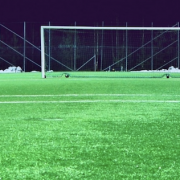Turf vs. Grass for Athletic Fields
Turf vs. Grass for Athletic Fields
Grass has too many disadvantages nowadays for it to be a better investment than synthetic turf. Especially for athletic fields, some of the disadvantages range from injuries to weather to maintenance. For example, if a heavy rainstorm occurred or a drought lasted longer than expected, replanting grass costs too much time and money. The field becomes muddy when it rains and dry and patchy when it doesn’t. Consequently, the upkeep is a full-time job between watering, mowing and edging. That’s why so many teams and schools have switched over to synthetic turf; the maintenance is obsolete compared to grass.
For synthetic turf, the minimal maintenance includes brushing the field every so often to keep the blades in an upright, neutral position and the infill leveled out; sweeping for larger debris like leaves; and aerating to ensure the infill is not compacted. FieldTurf has its own draining system for sweat, dirt, water, etc. and keeps away the growth of bacteria simultaneously. The most important factor is the water conservation as it’s redundant to water the field. It can also sustain throughout any type of weather conditions.
Moreover, synthetic turf is uniform without potholes and uneven surfaces that grass has. Some studies have found that synthetic turf lessens these injuries (Sources: FieldTurf). If we wanted to dig even deeper into the advantages, artificial grass is more appealing aesthetically too. All in all, the investment pays for itself. We can’t reiterate enough about the decreased upkeep and maintenance. From water conservation to minimal upkeep and to the advantages players gain from the improved field, grass has officially bit the dust.

